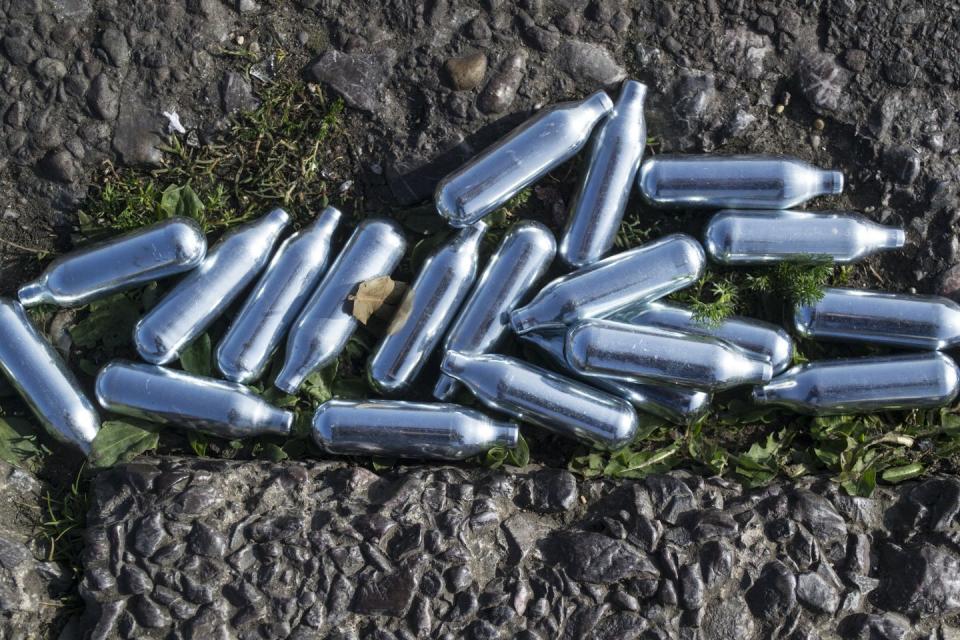24-year-old woman shares warning on Facebook after laughing gas left her paralysed

A 24-year-old woman has issued a warning on Facebook after being left paralysed thanks to laughing gas.
Olivia Golding from Bristol posted an old video of herself breathing in a balloon filled with nitrous oxide - otherwise known as laughing gas - to share her important message about the dangers of the frequently-used drug.
After having 15 balloons at a festival recently, Olivia began to experience a pins and needles sensation down her back. Just three days later, she become increasingly less mobile and she woke up one morning realising she couldn't move or speak properly.
"I felt like I'd been in the gym for six hours," she told ITV News West Country. Attending hospital, Olivia recalled how odd the sensation was. "I was walking in literally like an 80-year-old woman," she said.
Doctors immediately ordered scans, which revealed she had suffered damage to the top of her spinal cord and nervous system as a result of inhaling so many nitrous oxide balloons.
According to the NHS, when inhaled, nitrous oxide can make people feel euphoric and relaxed. However, it also has a risk of death, as lack of oxygen can occur when inhaling the gas. "This risk is likely to be greater if the gas is consumed in an enclosed space or if a substantial amount is rapidly used," the NHS warns.
Related Video: Nitrous Oxide Balloons Popular With Phish Fans
Olivia has lost all feeling in her body from her calves up to her shoulders. Her speech has been impeded, and she is now in a wheelchair, unable to walk unassisted, as a result of the damage laughing gas did to her body. Doctors don't know if she'll make a recovery.
Due to the serious nature of her condition, Olivia is now eager to spread word of how dangerous laughing gas can be. "Everyone's doing it, you don't think it's going to hurt you," she told ITV News West Country. "It can happen to anybody," she added.
On Facebook, in a post that's been viewed almost a million times and has been shared over 14,000 times, Olivia wrote: "Day 3 of being bed bound, I wanted to write this on social media to [raise] awareness to all of my friends that also use balloons of what the balloon is actually doing to your body.
"If this just stops one person from doing them I feel I would have succeeded in some way."
Olivia went on to say that because laughing gas canisters are so readily available at festivals, in clubs and even on the streets, people don't realise the danger they can carry.
"The [nitrous] oxide that is put into the balloon that we all crave is actually starving your brain of oxygen and eating away at your nervous system," she wrote.

"I have no feeling in my body from my calves to my shoulders and cannot use my hands. The doctors are now going to focus on trying to reverse this but I wanted to make everyone aware that the 20 second high off that one balloon could cause you weeks in hospital teaching yourself to walk properly again."
In a later post, Olivia detailed her experience further. "The damage from the [nitrous] oxide as left me something called Subacute combined degeneration of spinal cord - also known as Lichtheim's disease," she explained.
"My treatment has begun so now it’s a waiting game of the reversibility and the praying that it’s reversible."
Olivia added that people might read her posts and dismiss it as unlikely ever to happen to them, "but I thought that when I was sat with my friends and going to festivals until I woke up last week unable to move. It’s really not worth it," she wrote.
The NHS warns that nitrous oxide is a drug that slows down your brain and your body’s responses. The effects, it says, vary depending on how much has been inhaled, but it warns of hallucinations and sound distortions being common reactions, with unconsciousness also being a potential side effect.
"Mixing nitrous oxide with alcohol is especially dangerous as it can increase the risks associated with both substances and can lead to an increased risk of accidents or death," the NHS advises.
Follow Cat on Twitter.
('You Might Also Like',)

